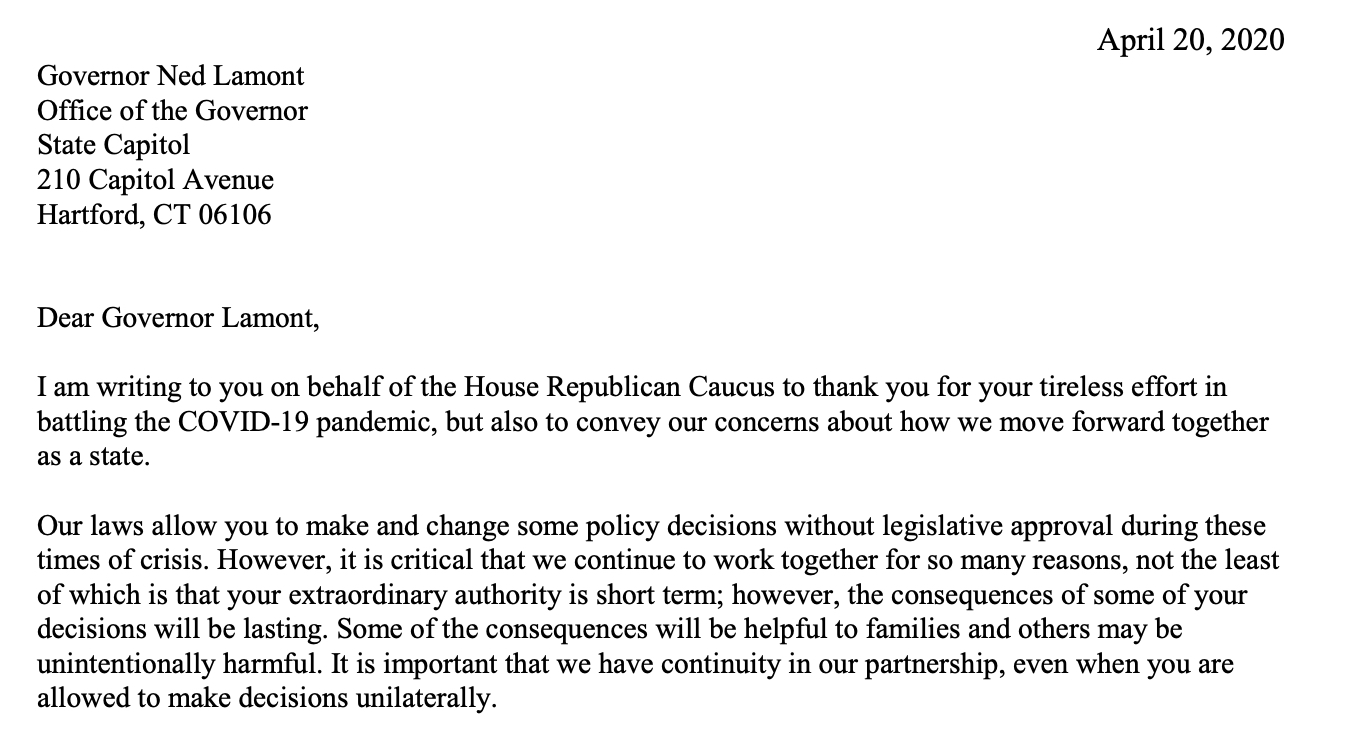House Republicans on Monday wrote to Gov. Lamont, asking not only for greater communication between his administration and the legislature, but also his administration and the general public with regard to the impact of his executive actions in this pandemic.
View the original letter here.
Dear Governor Lamont,
We are writing to you on behalf of the House Republican Caucus to thank you for your tireless effort in battling the COVID-19 pandemic, but also to convey our concerns about how we move forward together as a state.
Our laws allow you to make and change some policy decisions without legislative approval during these times of crisis. However, it is critical that we continue to work together for so many reasons, not the least of which is that your extraordinary authority is short term; however, the consequences of some of your decisions will be lasting. Some of the consequences will be helpful to families and others may be unintentionally harmful. It is important that we have continuity in our partnership, even when you are allowed to make decisions unilaterally.
As we alluded to in our last letter to you, it is our job as state legislators to be engaged in our districts and to listen to the constituents in cities and towns that we represent. This role allows us to share with you intimate knowledge and different viewpoints of residents and businesses throughout our diverse state. The reopening of the state is no exception; positions on this critically important decision differ based on a host of factors, but most significantly, based on where a person lives within the state.
The mechanism for reopening our state is reversing the policies in your Executive Orders. So, the most basic question that we have to answer together is: When do we start rolling back those policies? Understandably, the Reopen Connecticut Advisory Group does not have that answer yet; however, the Chairs of the Group generally indicated the concerns, observations, and outcomes that will guide decisions to begin the process of reopening our state:
- 14-day decline of cases/hospitalizations
- Mass testing, contact tracing, and self-isolation
- Protect high-risk populations
- Adequate supply of PPE
- Continued physical distancing regulations
- Adequate healthcare capacity for all
In concept, we agree that these are concerns that should be assigned significant weight. However, the fact that Group members have not yet identified specific non-public health concerns in the same way makes us question the degree of attention that is being given to other areas that impact the lives and livelihood of our citizens. Waiting on a cure or a vaccine is not an option so I think you would agree we must consider a balanced approach to reopening the economy and protecting Connecticut residents.
For example, although there has been reporting on job losses, these numbers are not highlighted in your press releases in the same way that you focus on the points above. The state has also seen a dramatic increase in domestic violence as a result of social distancing policies. But, your office does not release daily numbers showing increases in spousal and child abuse. In addition, the policy to ban "elective" medical procedures takes a toll on people with serious health conditions. To be clear, we are not implying that you are intentionally misleading the public by not publishing this information; rather, we are concerned that these kinds of unintended consequences will continue to be overlooked or diminished while considering when to reopen our state.
We are particularly concerned about the impact of isolation and social distancing policies on children. Professionals who regularly work with children would add an essential perspective to the Advisory Group. Therefore, we recommend including a special education teacher, pediatric social worker, experienced DCF employee, and a pediatrician to the appropriate subgroup(s). These are some examples of professionals who have direct contact with a vulnerable population and who would provide needed insight into policy impacts.
Again, we believe that your motives and intentions (and those of the Advisory Group) are sincere and good. We are suggesting that we continue our partnership during these times, which includes sharing different viewpoints and truly working together to reopen our state. In closing, we are not proposing an immediate reopening of the entire state. We are asking for
1) greater communication with legislative leaders before decisions are made and
2) greater communication with the public regarding the impact of policies being implemented.
As always, thank you for your commitment and the commitment of your staff during these difficult times. We look forward to working with you.
